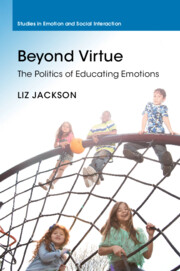
-
Select format
-
- Publisher:
- Cambridge University Press
- Publication date:
- October 2020
- November 2020
- ISBN:
- 9781108699747
- 9781108482134
- 9781108711609
- Dimensions:
- (229 x 152 mm)
- Weight & Pages:
- 0.54kg, 272 Pages
- Dimensions:
- (229 x 152 mm)
- Weight & Pages:
- 0.398kg, 272 Pages
- Subjects:
- Social Psychology, Psychology, Educational Psychology
You may already have access via personal or institutional login- Subjects:
- Social Psychology, Psychology, Educational Psychology
Book description
Educating students for emotional wellbeing is a vital task in schools. However, educating emotions is not straightforward. Emotional processes can be challenging to identify and control. How emotions are valued varies across societies, while individuals within societies face different emotional expectations. For example, girls face pressure to be happy and caring, while boys are often encouraged to be brave. This text analyses the best practices of educating emotions. The focus is not just on the psychological benefits of emotional regulation, but also on how calls for educating emotions connect to the aims of society. The book explores psychology's understanding of emotions, 'the politics of emotions', and philosophy. It also discusses education for happiness, compassion, gratitude, resilience, mindfulness, courage, vulnerability, anger, sadness, and fear.
Awards
2021 American Educational Studies Association Critics' Choice Book Award, American Educational Studies Association
Reviews
‘Recommended.’
D. L. Norland Source: Choice Connect
‘[Jackson] demonstrates a clear political awareness and a serious commitment to social justice.’
Winne Wong Source: Postdigital Science and Education
Contents
Metrics
Altmetric attention score
Full text views
Full text views help Loading metrics...
Loading metrics...
* Views captured on Cambridge Core between #date#. This data will be updated every 24 hours.
Usage data cannot currently be displayed.
Accessibility standard: Unknown
Why this information is here
This section outlines the accessibility features of this content - including support for screen readers, full keyboard navigation and high-contrast display options. This may not be relevant for you.
Accessibility Information
Accessibility compliance for the PDF of this book is currently unknown and may be updated in the future.


